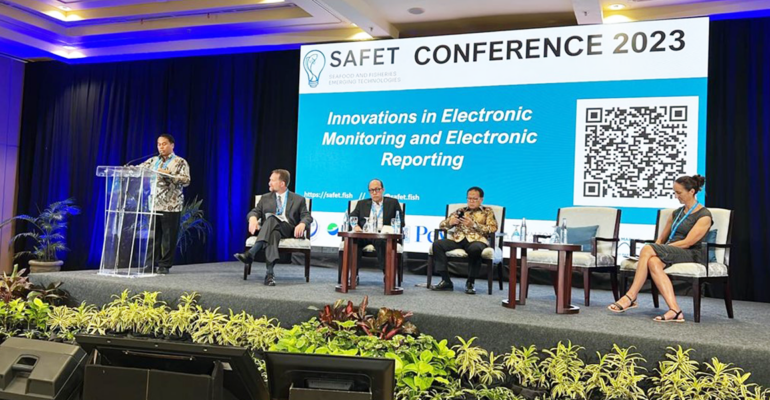Chairman of PKSPL IPB University Discusses the Urgency of Adapting Technology in the Fisheries Sector

Chairman of the Center for Coastal and Marine Resources Studies (PKSPL) IPB University, Prof Yonvitner said that technological adaptation for the fisheries and marine sector is a necessity. “We have to adapt quickly and carefully in this era of disruption, including in the fisheries and marine sectors,” said Prof Yonvitner at the 2023 Seafood and Fisheries Emerging Technologies (SAFET) international conference at the Westin Resort Bali, recently.
However, he said, these efforts must be supported by the community, including business actors. The best technology that aims to create efficiency and increase production can only be immediately accepted with appropriate educational efforts for the community and fisheries business actors.
“PKSPL IPB University’s research and experience in implementing artificial intelligence to increase feed efficiency and productivity in mariculture activities in the Seribu Islands has become educational for the community. “The system is integrated with community mariculture using precise artificial intelligence,” said Prof Yonvitner.
The conference entitled ‘Impact at Scale for a Sustainable and Resilient Future’ was attended by 30 delegates from all over the world. This year’s SAFET international conference and exhibition is a collaboration between the Ministry of Maritime Affairs and Fisheries (KKP), PKSPL IPB University and ID Food.
“This activity will be an opportunity to elaborate on research, innovation and technology. “Not just showing off individual innovations, but looking for inspiration to integrate with each other to be able to fill the needs for future innovation and technology in the field of fish catching and cultivation,” he explained.
Prof Rokhmin Dahuri, who represented the Minister of Maritime Affairs and Fisheries, said that Indonesia has a large marine ecosystem containing seafood and fisheries resources. Indonesia is the largest archipelagic country in the world with more than 17.000 islands, a coastline of 108.000 km (the second longest in the world, after Canada).
“About 75 percent of the total area (including Indonesia’s Exclusive Economic Zone/EEZ) is covered by seas and oceans. “Apart from that, around 30 percent of the total land area is covered by freshwater ecosystems including rivers, lakes and reservoirs,” he said.
Therefore, he said, Indonesia has one of the largest sustainable production potentials for marine and fisheries resources, namely around 115 million tons per year.
“Indonesia welcomes the implementation of the recommendations of the SAFET conference which aims, among other things, to overcome major challenges in the world of capture fisheries, aquaculture, the fish processing industry and marketing. “This is done by applying new technology and innovation including Industry 4.0 technology, ensuring long-term conservation, and sustainable use of marine biological resources and ecosystems,” he said.
Prof Rokhmin hopes that this meeting will highlight and release the latest technological developments that can be used to manage capture fisheries and aquaculture in a sustainable manner. In this way, these efforts are able to improve the welfare of the Indonesian people, especially fishermen and fish farmers, in a fair and sustainable manner. (nad/Rz) (IAAS/Res)



